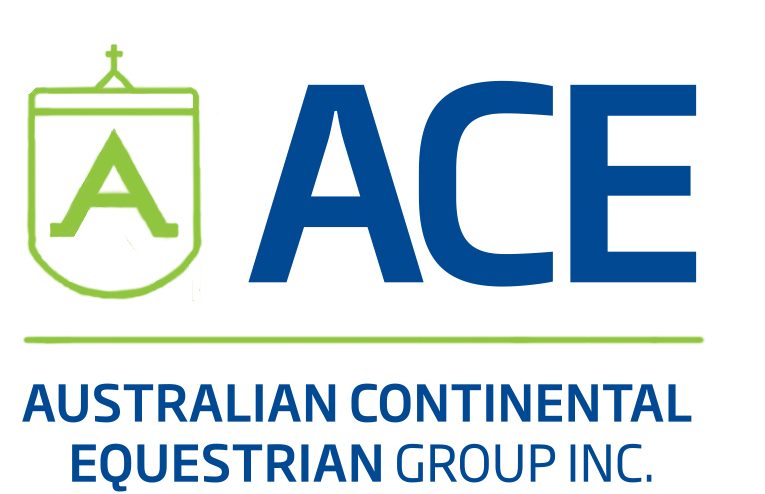Welcome To Australian Continental Equestrian Group Inc!
We are proud to be a member of the World Breeding Federation for Sport Horses (WBFSH).
The ACE Passport has been added to the list of “FEI approved national identification documents” available on the FEI website as well as on the FEI Database.
This means that this Passport can now be used as a national identification document for FEI horses.
Postal Address:
ACE Group Inc.
PO Box 224
Canungra Qld 4275
Phone: 0436 010 676
email to: [email protected]
Warmblood Fragile Foal Syndrome (WFFS) is an inherited systemic connective tissue disorder that is found in Warmblood horses. Skin lacks tensile strength (extreme skin fragility characterized by tearing, ulceration, etc. from contact with normal surroundings). Lesions can occur anywhere on the body but are most noted on pressure points and in addition to skin wounds, lesions are found on the gums and other oral cavity mucous membranes and the perineum. Limb joints are lax and hyperextensible. Fetlocks are the most dramatically affected and affected foals cannot stand normally. Other symptoms may include hydrops, subcutaneous emphysema, hematomas, or premature birth. Affected foals must be euthanized soon after birth.
WFFS is caused by a single mutation in lysyl hydroxylase 1 (LH1) gene. Mutations in LH1 are known to cause a similar disorder in humans known as Ehlers-Danlos Syndrome (EDS). The skin defects resemble, but are much more severe than those seen in the Hereditary Equine Regional Dermal Asthenia (HERDA), which has a later onset of symptoms.
Genes come in pairs with each parent contributing one copy to their offspring. With autosomal dominant genetic diseases only one defective gene is necessary to express the genetic disease in question. Such a gene can be inherited from either of the parents or from both parents. With recessive genetic diseases two copies of an abnormal gene (two copies = a pair) must be present for the horse to show signs of the genetic defect. WFFS is an autosomal recessive trait, meaning a foal can only be affected if the foal inherits the disease from both parents. Horses with only one copy of the defective gene are considered “carriers”.
Initial estimates were that between 6%-11% of the Warmblood population are carriers of WFFS but the test has not been widely utilised and as more people test it will be better understood the true carrier rate.
If both the sire and dam are clear of the gene mutation (N/N), then there is no chance of an offspring inheriting the mutation. If a carrier of the recessive allele (N/FFS) is bred to a normal horse (N/N), each foal has a 50% chance of having two copies of the normal allele (N/N) and a 50% chance of being a carrier (N/FFS). If two carriers are bred, each foal has a 25% chance of having two copies of the normal allele (N/N), a 50% chance of being a carrier (N/FFS), and a 25% chance of being affected (FFS/FFS).
So within the warmblood population, assuming a conservative 8% carrier status, the following statistics could be assumed. Out of 100 broodmares, approximately 8 would be carriers of the WFFS allele. If those 100 mares were bred to a carrier stallion, approximately 50 foals would inherit carrier status (N/FFS), 48 foals would NOT inherit the recessive allele and would be clear of the gene mutation (N/N), and 2 foals would be positive for the disease (FFS/FFS).
The focus for breeders needs to be on reducing risk and avoiding carrier-to-carrier breedings (which are the only combination that can potentially result in the fatal disease being inherited). With the vast majority of stallions and mares being untested, a breeder that tests their own mares will know either that their mare is clear of the mutation and regardless of the stallion’s status a foal would not inherit the actual disease OR that the mare is a carrier and while she herself won’t have any health risks, it will be important to know the status of potential stallion combinations for her and choose only to breed to a stallion who is himself clear of the recessive allele.
Testing is easy. It’s a simple hair pull (they can also test blood or semen) just like you are used to doing for DNA Proof of Parentage.
It is hoped that WFFS testing will become a requirement in the future and as such should be linked to the horse’s Parentage Verification DNA results.
Unfortunately no. You cannot assume status backwards as even two carrier individuals can produce a clear offspring. However, we do know that two clear parents will always mean a clear offspring.
This year has seen FFS or fragile foal syndrome get a lot of attention in the Warmblood community around the world.
Why is this?
– The FFS gene has been found in Thoroughbreds
– All evidence suggests it’s been in Thoroughbreds for several hundred years
– We have a lot of modern breeds whose foundation stock includes Thoroughbreds (ASH and Australian Ponies spring to mind as examples but there are bound to be many more ….read more of this extract from the Horse Genetics website
We do recommend breeders test their mares and stallions to identify carriers, but it’s very much worth noting that even if identified as a carrier, a mare or stallion does not necessarily lose value for breeding nor does it diminish its positive contributions to the breed; rather, identifying carriers simply ensures that mating with other carriers can easily be avoided, thereby preventing needless foal deaths, financial loss, and heartbreak.
